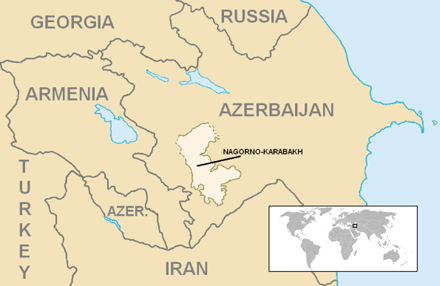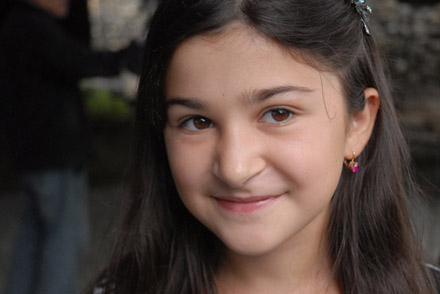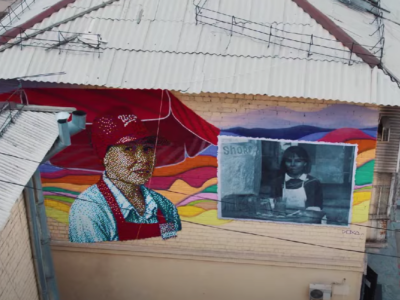This post is part of our special coverage Caucasus Conflict Voices.

For the past two years Global Voices has covered the use of new and social media to overcome differences between Armenians and Azerbaijanis still locked in conflict over the disputed territory of Nagorno Karabakh. Most recently, Global Voices presented on the use of new online tools in conflict resolution and transformation at conferences in Romania, Macedonia, Georgia and Chile.
Since then, some civil society organizations have embraced such tools as part of their own work in this area, as the American University's Micael Bogar hoped during an interview with Global Voices last year. More recently, BBC Azeri contacted Global Voices to contribute three pieces on the use of new and social media in bringing the two sides together [Part I, Part II, and Part III].
Now, as part of a new online journal dealing with the conflict, Caucasus Edition features a blog section. On it, several Armenian and Azerbaijani bloggers share their thoughts on the conflict and its possible resolution. Armenian blogger Edgar Khachatryan, for example, takes a slightly academic look at how the process of reconciliation between the two estranged neighboring countries can finally start.
People involved in peace activism may at times during their work encounter the problem of a lack of demand for peace activities and peace building in societies of countries involved in conflicts. This situation is the norm in the Caucasus. […]
[…]
Only after understanding the needs of our society toward peace can we demand that they be active in peace work, and only after understanding their needs can we declare that our work fits the needs of our societies and challenges toward creating peace.
As mentioned in a post on the Frontline Club where Skype was used to bridge the communication divide between Yerevan and Baku, Sirun Gharagyozyan, another Armenian contributor, remembers her first contact with someone from Azerbaijan.
Armenians and Azerbaijanis, representing conflicting countries, have long been denied the chance of mere communication, which unfortunately has resulted in two-sided hostility during confrontation anywhere on the globe. In fact, this confrontation occurs occasionally only within the frames of joint European or American projects outside the countries in conflict. […]
As an Edmund S. Muskie Graduate Fellowship Program alumna, I spent one academic year sharing a short-term lifetime with an Azerbaijani girl within the scopes of the same program. However, I am grateful that “Muskie” brought us together, otherwise the stereotypes I held against the Azeri people would have remained unbroken forever.
[…]
I have shared my most precious times with Leyla, my “Muskie” sister. We have gone through everything together. We traveled, we shared a bed, we shared food, we shared a wonderful piece of life together. Now when I look back on where we started and where we are now, I am amazed by the magic of friendship, love and peace we have created. I feel so proud we were courageous enough to have broken the ice and got the ball rolling. Leyla is the greatest friend of mine, and I hope many other Armenians will have such a precious friend as she.
For her part, Jamila Mammadova, an Azerbaijani contributor, remembers meeting her first Armenian.
I am an Azerbaijani who has been living in the U.S. A few months ago, I was invited to participate in an Azerbaijani–Armenian workshop. It was a 12-day event, and it was conducted between Armenians and Azerbaijanis in an isolated house in nature.
The beginning of that venture was difficult for me, as I faced a dilemma: Do I attend a workshop with Armenians, come face to face, eat, sleep, and spend 12 long days together? Or do I reject the invitation right now and forget about the existence of such a dialogue? For me, it was either I decide now or refuse to be broken in the middle and leave the dialogue by showing my weakness. […]
[…]
After few days I became a good friend with [an] Armenian participant. […] Not only are we neighboring states, we have always been confused because of our physical appearances that looked so much alike. […]
Fatalin, another Azerbaijani blogger, also notes the same similarities between the two nations, although explains that this is not necessarily always in the right areas. In particular, she notes, both sides continue to see themselves as the sole victim in the conflict while overlooking other issues relating to their future.
There are many common things between Armenians and Azerbaijanis. Culture, mentality, temper and drama are only some of them. But for me, the main thing that proves the presence of genetic likeness between these two nations is the maniacal obsessiveness they suffer from.
While reading this article and especially the first comment under it, I couldn’t stop thinking about processes we have going on this side of the border.
“Genocide,” say Armenians, “is our tragedy and it has to be recognized.”
“Khojali,” we reply, “and our losses are what matters.”
[…]
For some unknown reason we don’t find building democracy, educating people, fixing economy or actually implementing dusted laws as important as the recognition of some issues and preventing the recognition of others.
[…]
Recognition of past tragedies and losses, the return of Karabakh or it’s recognition as an independent republic will make us prove ourselves right, rise up and look around. But what are we going to see? The mess we forgot to clean while protesting in front of the embassies, writing articles, proving each other’s lies, looking through uncountable amount of photos of murdered children. Will any of that show us the way to fix things or give us a chance to start over? That’s the question we should ask ourselves.

Ethnic Azeri child, Karajala, Georgia © Onnik Krikorian
Global Voices will continue to monitor posts relating to the Armenian-Azerbaijani conflict as well as the possible use of new and social media in facilitating objective reporting as well as informed discussion and debate.
Most recently, those same online tools even brought Armenians and Azerbaijanis together in Tbilisi to cooperate on joint social media projects.
Global Voices’ special coverage of another conflict in the region between Russia and Georgia is here while a paper, Digital Media in Conflict-Prone Societies by Global Voices Executive Director Ivan Sigal, is also available here.
This post is part of our special coverage Caucasus Conflict Voices.







9 comments
Azerbaijan needs to realise the region is Armenian and was Armenian long before Russia made a mess of the Caucasus division. Armenians have populated Artsakh (which is the correct name for the region) since before an Azerbaijan existed, since before Turcic tribes invaded. I have visited the region and found peace, harmony, reconstruction, modernisation, government, economy, foreign interest, since the Azeris lost control. A reason to live has returned to the people.
On a related note, was very pleased to see Oxfam also cover the use of new/social media in Armenia-Azerbaijan conflict transformation recently.
Soviet washing machines and the cyberspace social revolution in the Caucasus
Actually, there’s an interesting blog post by an Armenian contributor, Irina Ghaplanyan, on the site as well that’s worth quoting:
http://caucasusedition.net/blog/moderating-effects-of-shared-regional-identity/
It’s also encouraging to see that a clear editorial policy has been brought in for the site including the blogs, especially as it relates to contentious, emotive naming issues as well as general tone. This is very relevant given the tendency to go down that path to actually avoid or disrupt discussion and communication.
http://caucasusedition.net/guidelines-for-contributors/
So, can new and social media continue to fill the gap left vacant by a politicized and/or nationalist media in Armenia and Azerbaijan or one that usually self-censors? At the very least can effective use of such tools to encourage discussion and debate push the local media to cover Armenian-Azerbaijani issues more objectively?
Let’s see.
This is all good. But I can see equations were proposed. Kojali=1915 Genocide? Writing articles to prove each other lies? Does this mean that Armenians lied as much as Azeris ? Azeries have to learn to be more factual and improve their critical thinking.
Azeries might very well carry in their blood the ethnical DNAs of Caucasus, but in the past they showed that they carry Turkic culture, which is different from Persians, Armenians and Greeks. The good thing is that Turkey is changing for better I think. And hopefully Azerbaijan will follow and do the same soon.
Inkna,
I think you took the two references out of context. i.e. there is no connection between reference to 1915 and Khodjali with then talk of ‘proving each others lies.’
What we do have, however, is a situation where each side remembers only it’s pain and denies that the other side did as well.
However, I don’t think that’s the point of Fatalin’s post. Instead, her message seems to be more one of always looking ONLY to the past to the detriment of the future.
Interestingly, it looks as though the Eurasia Partnership Foundation (EPF) will now be adding online media, including citizen media, to their monitoring of media bias in Armenia-Azerbaijan conflict reporting:
http://epfound.am/index.php?article_id=302&clang=0
Global Voices’ Caucasus editor will take part in one of the preliminary meetings for this new project this month.
Interesting thing is to have exchange of views across boarders. This perhaps would create broader understanding among the two nations. But I am hoping of a possibility of international effort to make leaders of this nations to embrace open medium for exchange of views what some of their citizens are doing right now. The world can only be a better place when views are shared.